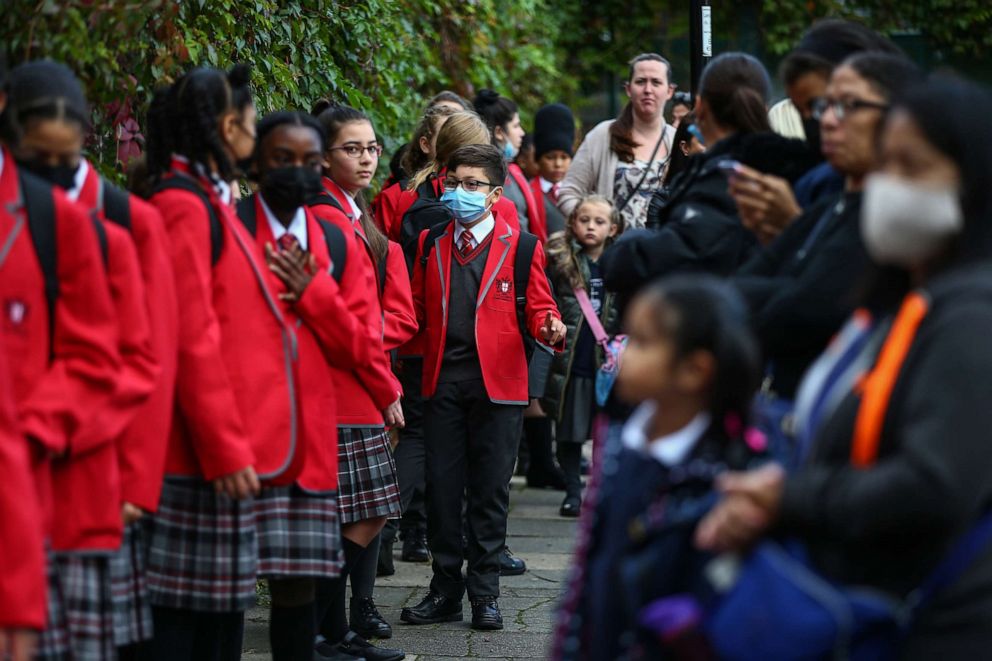Maskless and unvaccinated, millions of pupils have returned to English schools
In England, the government has not issued a mask mandate in schools.
LONDON -- As the debate on masking in classrooms rages in the U.S, England, as with its risky move to fully reopen society in July, is charting its own course. Despite competing scientific advice, in September millions of mostly unvaccinated children returned to school -- with new government guidance. Masks, in the English classroom, are no longer recommended.
Part of the calculation stems from the success of the U.K.'s vaccination program -- and the belief that parents who could potentially catch the virus from their children are mostly protected from two doses, which has led to criticism from some scientists.
More than 45 million people in the U.K. have received two doses of coronavirus vaccines, which amounts to 82.5% of the population over 16, according to government data.
Children aged 12 to 17 are now eligible for a first shot of the vaccine, and all people above 18 are encouraged to get both shots.
Since July, the weekly average of daily coronavirus cases has not fallen below 20,000. However, that has not been as bad as early predictions -- Health Secretary Sajid Javid previously warned that with a full reopening cases could reach 100,000 a day, heights which have not been reached. Deaths have risen too, but the success of the vaccination rollout has prevented a return to the worst days of the pandemic, with 8,627 deaths recorded between July 1 and Oct. 1.
Yet with cases remaining high, parents have expressed concern about their children returning to school.
According to the most recent government guidance: "As COVID-19 becomes a virus that we learn to live with, there is now an imperative to reduce the disruption to children and young people's education -- particularly given that the direct clinical risks to children are extremely low." Pupils who test positive are still expected to self-isolate, but face coverings are not advised, as with other public spaces, with the emphasis instead on improved ventilation and hygiene.
However the government has not ruled out a reversal on this guidance in the case of increased outbreaks in schools. Asked by Sky News on Thursday if some of the contingency plans in case of outbreaks would include a return to mask mandates, the secretary of state for education, Nadhim Zahawi, said he was considering a range of options including masking.

The risk of death in unvaccinated children, according to the U.K. government's vaccine surveillance reports, remains very low. In one study published in July by researchers from University College London, and the Universities of Liverpool, Bristol and York during the first 12 months of the pandemic, 25 under 18-year-olds died from COVID in England, which amounts to a mortality risk of 2 in 1 million.
However, a study in the U.S. found that masking in classrooms significantly decreases the risk of COVID outbreaks.
Experts across the U.K. disagree even on the effectiveness of masks to protect kids from getting the virus. Professor Calum Semple, a member of the Scientific Advisory Group for Emergencies, recently told BBC Radio 4 that ventilation was in fact the best measure to prevent infection.
"If I had to invest in a single activity to improve the environment both for the children and the adults, I'd be looking at improving the ventilation... improving air exchanges," he said, adding "that would be a much more effective way to reduce transmission in schools."
Dr. Deepti Gurdasani, an epidemiologist and senior lecturer at Queen Mary University of London, told ABC News that too little is known about the long-term risks in children to allow high exposure to schools in COVID, and that the government's laissez-faire approach has been "reckless."
"These sort of policies are essentially fueling transmission in the name of reducing education disruption and in fact making that education disruption worse," Gurdasani said.
Many schools have continued to encourage mask-wearing, she said, despite the central policy that they are now compulsory.
"The measures are so basic and simple," Gurdasani said, adding, "it's extremely important to keep schools open. But if you want to keep them open, you cannot be anti-mitigation and anti-vaccine because that is the only way to keep them open."
Although 99.9% of U.K. state-funded schools are now open, recent reports suggest more students have missed school for COVID-related reasons in September.
Just over 2% of pupils -- 186,000 students -- across all state-funded schools were out of school on Sept. 30 because of suspected or confirmed COVID infections, according to government data.
"We have to make our own risk assessment as parents or grandparents and we have to decide if we are comfortable with our children going to school and if we're not why are we not," said David Heymann, a professor of infectious disease epidemiology at the London School of Hygiene and Tropical Medicine. "And if it's because of the fear of getting infected ourselves, then we should get vaccinated. If it's a fear about children not wanting to wear a mask, then we should find out whether children really do or don't want to wear a mask."
According to the information currently available, Heymann said, there appears to be greater risks in areas like nightclubs, which are now fully open in the U.K., but more data is needed on transmission in schools.
"The best way to be evaluating this is to look at children in school and their families, and if you could test students once a week and test their parents once a week and see if there is any increased transmission in them as compared to the general community," he said. "Now there's lots of ways of doing this, it's just that we are so early on, it's only 18 months and we don't have all the data we need because of the lockdown of last year."





